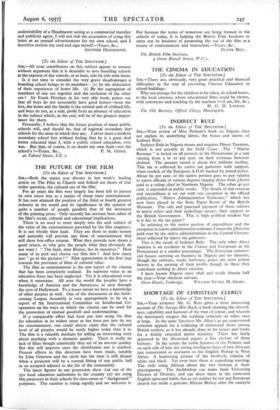THE FUTURE OF THE FILM
[To the Editor of THE SPECTATOR.]
SIR,—Both the topics you discuss in last week's leading article on The Film in Church and School are facets of that wider question, the cultural use of the film.
For 4o years the film very largely has been left to pursue its own sweet way as a means of cheap mass entertainment. It has now attained the position of the third or fourth greatest industry in the world and its significance in the opinion of quite a number of people parallels that of the invention Of the printing press. Only recently has account been taken of the film's social, cultural and educational implications.
There is no need to enter deeply into the arid subject of the value of the entertainment provided by the film magnates. It is not wholly their fault. They are there to make money and naturally will provide any form of entertainment that will show box-office returns. What they provide now shows a good return, so why give the people what they obviously do not want ? " The fault, dear Brutus, lies in ourselves." How many of us pick and choose our film fare ? And how many just " go to the pictures ? " Film appreciation is the first step towards the provision of films of cultural value.
The- film as entertainment is the one aspect of the cinema that has been completely realised. • Its supreme value as an educative force has been neglected. Yet it is educational even when it entertains. All over the world the peoples have a knowledge of America and the Americans, as seen through the eyes of Hollywood. To a lesser extent we have a knowledge of other peoples as well. One of the discussions at the forth- coming League Assembly is very appropriately to be on a report 'of the International Comniittee on Intellectual Co- operatioh on the ways in which the cinema can be used for the promotion of mutual goodwill and understanding.
If -a comparable effort had been- put into using the film for education in its widest sense as has been put into its use for entertainment, one could almost claim that the cultural level of all peoples would be vastly higher today than it is. The film is a valuable medium for telling an interesting story about anything with a dyliamic quality. There is really no lack of films though admittedly they are of an uneven quality. But this will improve once the dittribution nut is cracked. Pioneer efforts in this direction have been made, notably 'by John Grierson and his circle but the time is still distant when a' projector will be a normal fitting of any public hall as an accepted adjunct to the life of the community.
The latest figures in our' possession 'show ttat out of the • 35r 'local education authorities in the -country 157 are Osing 669 projectors in their schools for class-room or " background" purposes. The number is rising 'rapidly and we welcome it. For because the tastes of tomorrow are being formed in the schools of today, it is helping the British Film Institute to carry out its business of promoting the use of the film as a means of entertainment and instruction.—Yours, &c., The British Film Institute, 4 Great Russell Street, W.C.r. OLIVER BELL.






































 Previous page
Previous page